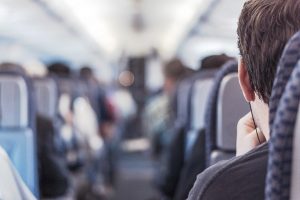 Whether you’re an occasional or frequent flier, there’s a good chance you’ll sleepy once the airplane has reached cruising altitude. While often small and with limited legroom, airplane cabins are relaxing. You can lounge back in your seat with the window blind closed to catch some rest. However, that’s not necessarily why flying makes you sleepy. There’s a more scientific reason for this phenomenon.
Whether you’re an occasional or frequent flier, there’s a good chance you’ll sleepy once the airplane has reached cruising altitude. While often small and with limited legroom, airplane cabins are relaxing. You can lounge back in your seat with the window blind closed to catch some rest. However, that’s not necessarily why flying makes you sleepy. There’s a more scientific reason for this phenomenon.
It’s All About Pressure
The reason it’s so easy to fall asleep when flying is because the air pressure inside of an airplane’s cabin — when the airplane has reached cruising altitude — is lower than that of which our bodies are used to experiencing. Airplanes do, in fact, have pressurized cabins. With that said, the pressure is still significantly lower than ground-level pressure.
Commercial airplanes fly at an altitude of about 31,000 to 37,000 feet. At this altitude, cabin pressure is roughly the same as 6,000 to 8,000 feet above sea level. Therefore, cabins are still pressurized, more so than the air outside of airplanes, but they are less pressurized than the air on the ground. Experts believe that exposure to this low-pressure cabin air makes passengers feel sleepy.
Pressure affects how much oxygen your body is able to absorb. The lower the air pressure, the less oxygen your body will absorb. The U.S. Federal Aviation Administration (FAA) requires airplanes to have a safe level of air pressure in their cabins. However, it’s still lower than the air pressure on the ground. This means your body will absorb less oxygen when flying, and as oxygen levels in your blood decrease, you may feel tired and sleepy.
Humidity May Also Play a Role in Sleepiness
While the main cause of flying-related sleepiness is cabin pressure, humidity may play a role in it as well. Airplanes have moderately dry cabins. Most airplane cabins, in fact, have a relative humidity of just 20%. To put that number into perspective, most homes have a relative humidity of about 40% to 60%. With cabins being up to three times as dry, they can cause certain changes in how you feel, such as increased sleepiness. The dry air will make you feel tired, allowing you to easily fall asleep.
You can’t control the pressure or humidity when flying. As a result, you should consider using this opportunity to rest and relax. Whether it’s a short 30-minute flight or an extended eight-hour flight, you can take a nap while lounging back in your chair.



